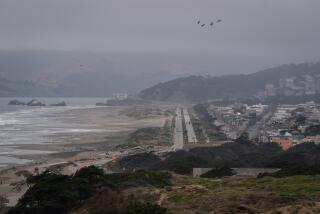Paying for a clean port
To those who follow developments at L.A.’s giant port complex, the source of much of the region’s smog, traffic and economic growth, it seems very odd that Mayor Antonio Villaraigosa is failing to back a critical state bill that would provide money to help clean up port operations and get cargo off the roads and onto rail lines. Green growth at the ports, after all, has been a policy priority of the mayor’s.
But the back story on SB 974, sponsored by Democratic Sen. Alan Lowenthal of Long Beach, is complicated and involves a state/local split that has been worsened by terrible decision-making in Sacramento. Villaraigosa may not be exactly right, but he isn’t exactly wrong, either.
Lowenthal’s bill would impose a $60 fee on each filled 40-foot container moving through the state’s ports. The $394 million generated annually would be spent on projects that reduce air pollution and speed the movement of goods along rail lines. None of the money could be spent on road or highway projects, a bone of contention with port officials and the mayor, who want to use the funds to shore up two crumbling bridges near the ports.
Lowenthal had good reason for shunning road projects. Shippers are threatening to sue the state if the bill passes, arguing that the fee would constitute an illegal tax rather than a user fee. Proceeds from user fees are supposed to be spent only on projects that benefit the payers or clean up their messes, so spending the money on roads -- which are used by the general public in addition to trucks carrying cargo -- might make the state vulnerable to legal challenges.
At the same time, Villaraigosa and the ports have good reason not to trust Sacramento to spend the money appropriately. The governor and the Legislature have a bad habit of grabbing money designated for specific purposes to fill gaps in the general fund. Andthe California Transportation Commission, which would allocate some of the container-fee money, has been dawdling with the $3.2 billion in bonds that voters approved last year for port cleanup and infrastructure. Los Angeles is underrepresented on the commission, and its decisions so far on bond money make it clear that the panel has no interest in giving the city its fair share.
Further complicating matters is that the ports want to impose their own container fee under their clean-air plan, which is expected to be approved this fall. That would allow the ports to collect and allocate the money, and they would doubtless spend it on rebuilding the bridges as well as on rail and clean-air projects. Local officials would much rather maintain local control of the money than send it to Sacramento.
The danger with this jurisdictional spat is that it could end with neither container-fee proposal getting the nod. Though we trust the ports with the money more than we do the state, what really matters here is that shippers and retailers start paying their share to build the infrastructure needed to move their goods while lessening the deadly environmental effects. Lowenthal and the ports should work out their differences and work together on a single container-fee plan, then use all their influence to get it passed.
More to Read
A cure for the common opinion
Get thought-provoking perspectives with our weekly newsletter.
You may occasionally receive promotional content from the Los Angeles Times.






